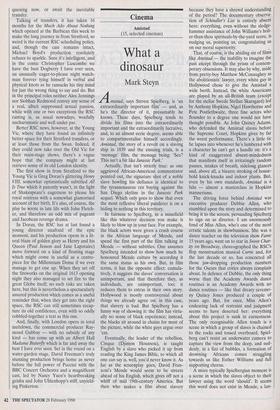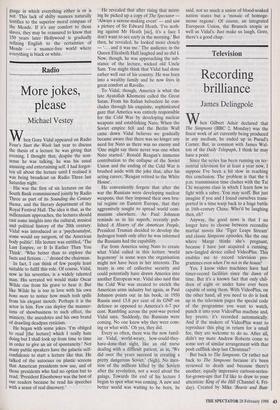Cinema
Amistad
(15, selected cinemas)
What a dinosaur
Mark Steyn
Amistad, says Steven Spielberg, is 'an extraordinarily important film' — and, as he's the director of it, presumably he knows. These days, Spielberg tends to divide his films into the extraordinarily important and the extraordinarily lucrative, and, to an almost eerie degree, seems able to compartmentalise himself accordingly. Amistad, the story of a revolt on a slaving ship in 1839 and the ensuing trials, is a `message' film, the message being: 'See? This isn't a bit like Jurassic Park.'
Actually, that isn't strictly true: as one aggrieved African-American commentator pointed out, the signature shot of a noble slave howling his defiance is identical to the tyrannosaurus rex baying against the San Diego skyline in the Jurassic Park sequel. Which only goes to show that even the most reflexive liberal panderer is on a hiding to nothing in this territory.
In fairness to Spielberg, in a minefield like this whatever decision you make is likely to blow up in your face. For example, the black actors were given a crash course in the African language of Mende, and spend the first part of the film talking in Mende — without subtitles. One assumes Spielberg intended to show how much he honoured Mende culture by according it the same status as his own. But, in film terms, it has the opposite effect: cumula- tively, it suggests the slaves' conversation is unimportant, and that therefore they, as individuals, are unimportant, too; it reduces them to extras in their own story. Hollywood is mostly controversial about things we already agree on: in this case, that slavery is bad. But Spielberg has a funny way of showing it: the film has virtu- ally no sense of black experience; instead, the blacks sit around in chains for most of the picture, while the white guys argue over 'em.
Eventually, the leader of the rebellion, Cinque (Djimon Hounsou), is taught English by a slave who picked it up from reading the King James Bible, to which all one can say is, well, you'd never know it. As far as the screenplay goes, David Fran- zoni's Mende would seem to be streets ahead of his English, which gives off not a whiff of mid 19th-century America. But then who makes a film about slavery because they have a shrewd understanding of the period? The documentary observa- tion of Schindler's List is entirely absent here: everything, even without the sledge- hammer assistance of John Williams's holi- That, of course, is the abiding sin of films like Amistad — the inability to imagine the past except through the prism of contem- porary obsessions. It may also by why, aside from pretty-boy Matthew McConaughey as the abolitionists' lawyer, every white guy in Hollywood chose to give the Amistad a wide berth. Instead, the white Americans are played by an all-British team (except for the stellar Swede Stellan Skarsgard) led by Anthony Hopkins, Nigel Hawthorne and Pete Postlethwaite, three fine actors who flounder to a degree one would not have thought possible. As John Quincy Adams, who defended the Amistad slaves before the Supreme Court, Hopkins gives by far the worst performance. There's a little tic he lapses into whenever he's lumbered with a character he can't get a handle on: it's a kind of exaggerated absent-mindedness that manifests itself in irritatingly random pauses, intakes of breath, sidelong glances and, above all, a bizarre stroking of house- hold knick-knacks and indoor plants. But, even by his own standards, Amistad is a lulu — almost a masterclass in Hopkins mannerisms.
The driving force behind Amistad was executive producer Debbie Allen, who stumbled upon the story and determined to bring it to the screen, persuading Spielberg to sign on as director. I am enormously fond of Miss Allen, who's one of the most erratic talents in showbusiness. She was a dance teacher on the television show Fame 15 years ago, went on to star in Sweet Char- ity on Broadway, choreographed the RSC's flop menstruation musical Carrie and, for the last decade or so, has concocted all those jaw-dropping production numbers for the Oscars that critics always complain about. In defence of Debbie, the only thing worse than the Academy Awards dance routines is an Academy Awards with no dance routines — like that dreary ceremo- ny Quincy Jones produced a couple of years ago. But, for once, Miss Allen's endearing lack of restraint and judgment seems to have deserted her: everything about this project is sunk in earnestness. The only recognisable Allen touch is a scene in which a group of slaves is chained to the rocks and tossed overboard. Spiel- berg can't resist an underwater camera to capture the view from the deep, and sud- denly, in a fizz of bubbles, a formation of droWning Africans comes struggling towards us like Esther Williams and full supporting chorus.
A more typically Spielbergian moment is a scene in which the slaves object to their lawyer using the word 'should'. It seems this word does not exist in Mende, a Ian- guage in which everything either is or is not. This lack of shifty nuances naturally testifies to the superior moral compass of the Mende. If it's any comfort to those slaves, they may be reassured to know that 150 years later Hollywood is gradually refining English to the certainties of Mende — a nuance-free world where everything is black or white.



























































 Previous page
Previous page